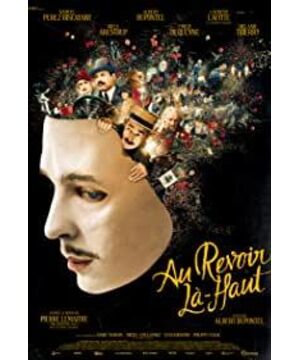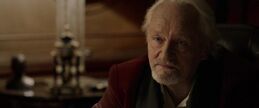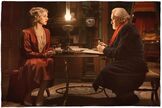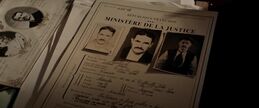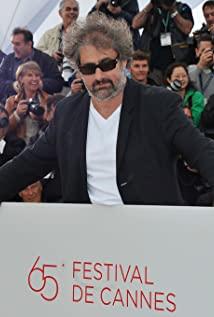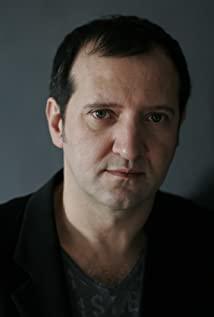【Put on the mask, no need to say goodbye】
If I had to die, I would take darkness as a bride. ---Voynich, "The Gadfly"
Can't believe a movie like this would be labeled "unpopular". Its high artistry and so-called commerciality for the masses have achieved a highly consistent fusion in the juxtaposition of humor and tragedy. Not a single second of this movie is boring, it's so painful from the start, but it manages to waltz the comedy everywhere and then make you cry.
From the aesthetics of the set, to the movement of the camera, from the shaping of each distinctive character, to the just right sad soundtrack, from the accurate rhythm control, to the stylization of the coexistence of humor and sadness, from the story to the development of the climax. All in one, like a fun and dripping classic movement, playing in the world in front of you.
Its emotional delivery goes straight to my heart. I watched this movie with a whole sad mood, and I cried several times. The pain hit the forehead, and people couldn’t get away from it after the movie was over.
After Edward's despair, wearing a mask, he seems to be no longer an individual, but, like "V", has become a symbol of war, class accusation and revenge. But he is different from "V", his personal complex, like a dream-like review of childhood trauma, makes his ego permeate the whole process all the time.
Because we haven't read the original book, we can expand the possibility of his behavior based on the imagination of the movie (this is also the imagination space that the movie can give the viewer). We can imagine these three situations: one, Edward did not know that his father could find the mark and thus found himself, leaving the mark was purely a matter of habit, and his father's discovery was a dramatic coincidence; two, Edward set a trap, deliberately so , let his father find him, so as to complete the whole revenge; three, Edward left a mark, is the subconscious hope to reunite with his father, is the child's heart, hope to fulfill the childhood regrets, to prove the father's love.
To associate the whole movie from these three scenarios, there will be completely different interpretations of the protagonist's behavior and spiritual world, and different analysis of his jumping. If it is a set-up, the last leap is the cruelest link of class and family revenge; if it is any other reason, it is the inevitable destruction of the self.
Death is the inevitable fate of Edwardian characters. It was doomed from the moment he saw his irreparable appearance. Some say it was doomed from the moment he left home to join the army, that in order to rebel against his father and his class, he took himself into the most brutal and dangerous battlefield, a struggle to the death that tends to self-destruct. But this is not inevitable. If he returns from the battlefield completely, he may have another life. There is no despair to make him a crazy artist. Then when he reaches middle age, he may reflect on his youth and frivolity, and his father and his father Son may reconcile, may not, in short, that's another story. But his appearance was ruined, and the mad soul must lead him to death.
This is the difference between people. Many veterans were also disabled and lost part of their bodies, but they still survived, even as ants. They faced reality. Edward also faced the reality, but he had the heart of an idealist who loved fantasy; anyone who had been ingrained in his idealism since childhood would understand what such pain meant. Even if we are not physically handicapped, nor do we suffer from worldly poverty, the gap between ideals and reality makes despair often invade, and Nietzschean destruction lurks ahead. Alive, morphine, realized... I know in my heart that I am waiting, waiting for that leap one day.
Who doesn't live on morphine in order to get through the mental anguish? What is the morphine on your mind and mine, and how do you stop the headache?
It is precisely because it is impossible to put a mask on the mind and face life by relying on true lies, so it is necessary to put a mask on the body. The face is hidden under the mask, but the soul is exposed to the fiery nature of life. Because of the burning pain, we weep in the mask; and because of the protection of the mask, no one can see the tears behind the mask and the ugly and twisted face.
Edward can't forgive his father the most, but he is like the gadfly in "The Gadfly", he hates his father the most, seeks revenge on his father, mocks those in power, but he avoids admitting it is what he loves the most A person is also a father, and what he desires most is his father's love. In "The Gadfly", the stubborn Archbishop of Montanelli failed to reconcile with his son in the end, thus killing his son and himself; in this film, the father put down his obsession and expressed After belated love and approval, father and son reached a reconciliation.
And the success of shaping this father's character lies in the strong contrast. From Edward's dream, we quickly understood the cold relationship between father and son through the director's concise and contagious lens. The image of the father at this time is hateful, indifferent, and inhuman; just as we are immersed in such cognition, When the father's role is moved closer to the villain, the film immediately reverses it, which gives us a knowing blow: it turns out that the seemingly cold father is also a father. He just doesn't know how to express his love for his children; Those in power have directly or indirectly killed other people's lives and obtained money from the people, but in front of their sons, he is also like a father in the world. So this contrast made me cry for this old and lonely old man.
With a warmer explanation, Edward did act like a child. With his tragic provocation and noise, and with his incomparable willfulness, he was saying: Father, look at me. The father finally turned his head and saw his devastated child. They embraced.
So, I'd rather see Edward jumping off a building in front of his father as a kind of dramatic arrangement that books and movies need. Because Edward could never take off his mask and face his father, his self-esteem would not allow it, and he must also seek death as a transcendence of the self and liberation of freedom. But now that he has forgiven his father, and the father and son have reconciled, the reasonable behavior should be for him to die in silence where his father cannot see him. Otherwise, it can only be interpreted as Edward's last willfulness, he was so willful that he was so immersed in himself that he could not understand what his own death meant to an elderly father. Otherwise, go back to the second scenario envisaged above, where he would have to deal with his father the most brutal revenge—let him witness an irreversible death—but this interpretation not only does not fit the embrace of reconciliation, And too cruel.
This reminds me of a recent news: a high school student, provoked by his mother's abuse, rushed out of his car and jumped off the overpass to his death, but the mother rushed over but failed to hold the child, after the child disappeared on the bridge , crashed and cried while sitting in the traffic. This is a kind of punishment that is worse than death. I don't believe that Edward, who embraced his father, would adopt such a mentality to die. Because this face-to-face jump, whether or not the father is still alive, is not a gesture of reconciliation, but pulls the old man into the grave of hell.
So I tend to think that this is an artistic arrangement for the climax of the drama----after the embrace, it is ashes, everything can't go back, the spirit has reached the extreme of suffering, the final boundary is broken, Only by leaving this world, there is no yearning for the next life, let nothingness become nothingness, only death itself.
We know loneliness, but we hardly perceive it anymore because we think loneliness has become a part of ourselves. Until a certain moment, such as this moment, we stepped out of our hut from our own time and space, and suddenly merged into the surging crowd of Wangfujing Street, and was overwhelmed by countless people: old people, children, sallow women, Youth wearing trendy brands, couples, security guards repeating their work... We fell into a strange world, life, life, life, the lives of countless kinds of people surrounded and walked away, no sense of direction, only huge and small Makes you want to escape this world.
Loneliness----The loneliness on the body is manifested, standing in the front, staring at us face to face in the crowd. Like Edward, with a mask on, the tears won't be seen.
The laughter is chaotic, the absurd and mad, the golden fan is drunk, and it is nothing; from Edward's melancholy eyes, I see the world.
Everyone who passes by will never be seen again.
See you in heaven.
View more about See You Up There reviews


